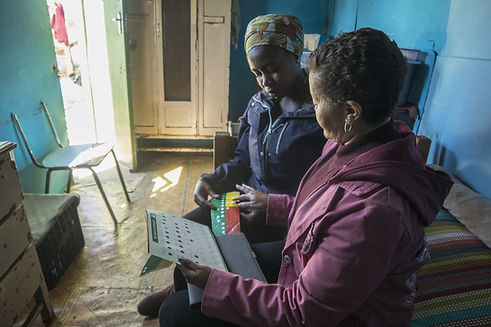
FURTHER LEARNING: activating a resilient spirit
The Saville Foundation supports self- actualisation programmes that strengthen resilience. When the approach is inside-out, individuals fully dictate their own circumstances.
The impact of this work is due to practitioner's personal focus in offering support for people to change their lives - and achieve their goals on their own terms. This means meeting people where they are at, strengthening their sense of Self and their will to respond creatively to life's challenges, in order for them to be uniquely successful.

Data for the people by the people

Who learns
-
Families & Communities
-
Donors, funders
-
NGOs
-
Policymakers
-
Corporates
What they learn
Families & Communities
-
What it feels like to be truly heard and seen.
-
How to identify and navigate their current position in Maslow’s hierarchy—emotionally, socially, and economically.
-
What it means to take control of their own future through self-empowerment, improvement, and entrepreneurship.
-
How to co-create a new reality free from poverty—together, with others in their community.
Donors & Funders
-
To stop assuming what communities need, and instead learn to listen.
-
How to understand and leverage social data generated from the bottom-up.
-
That sustainable transformation doesn’t come from patching over problems, but dissolving them at the root.
NGOs
-
How emotional, personal, and economic development are interlinked and inseparable.
-
To shift from top-down missions to need-driven action—where the community's voice becomes the compass.
-
How collaboration across traditionally siloed sectors leads to holistic relevance and resilience.
-
That relevance is not what you deliver, but how you're trusted within a community.
Policymakers
-
How to use real, lived-experience data to inform legislative direction and improve outcomes.
-
That integrating community-informed insight leads to policies that actually stick.
Corporates
-
That true CSI (corporate social investment) is not PR—it’s systemic participation.
-
How to use their broad-based empowerment portfolios to catalyse real impact, leveraging grassroots data for long-term social innovation.
Exponential effect
For decades, social and economic development programs have been based on assumptions about what underserved communities should need—decided by outsiders, with little real data or participation from the people most affected. The Greenlight Movement turns that logic inside out.
By creating bottom-up data flows—from people, for people—it unlocks the bottleneck that has kept communities disempowered, unheard, and under-resourced. This is not about gathering data for compliance or reporting. It is about awakening agency. When people self-assess and articulate their own needs, they activate latent capacity. Systems become responsive instead of extractive.
Funders invest in what works because it comes from the ground up. NGOs evolve from deliverers to partners. Policy becomes rooted in reality. The result? An ecosystem that learns from itself and scales what matters, not what looks good on paper.
Our role
-
Seed funded organisation due to belief in approach and methodology
-
Played a strategic advisory role as member of the board and
-
Provided all capital for the Greenlight alone for 10 years to prove the model and grow the movement
-
Galvanised external partner foundations to meet the needs for expansion and broader dissemination of the model and the services of the Greenlight tool.
-
Walk with and support management and the team wherever necessary (and when requested)
Who learns
-
Individuals and Households
-
Community Organisations
-
NGOs & Civic Groups
-
Policymakers & Service Providers
Exponential effect
When people learn to name their own challenges—and co-design responses—change ripples outward.
Individuals step into agency. Community groups become proactive problem-solvers. Service providers shift from guesswork to clarity. Over time, systemic solutions stop missing their mark and begin to meet real needs. That's impact rooted in understanding, not assumption—making poverty reduction a movement grounded in dignity and shared insight.
What they learn
Individuals and Households
-
How to identify their real, unique needs using a self-assessment tool.
-
How to co-create personalised solutions—beyond handouts—to build agency and change their lives.
Community Organisations & NGOs
-
How to gather real-time data with dignity and bring community voices into strategy.
-
Partnering to transform raw insight into effective, relevant programmes.
Policymakers & Service Providers
-
How to access bottom-up intelligence to inform better policy and service design.
-
How to embed feedback loops so systems evolve based on lived realities.
Our role
-
Provide initial operating capital for UK office to support the poverty alleviation model in the ‘developed’ world
-
Supported SIGNAL throughout CV-19
-
Provided ongoing operating capital and strategic insights as required
-
Introduced partner foundations to support the journey
-
Mentor and support management team
Who learns
-
Young agricultural apprentices
-
Educators & Mentors
-
Families & Communities
-
Employers & Industry Stakeholders
Exponential effect
A single apprenticeship doesn’t just change one life—it sets off a chain reaction. As young people step into practical agricultural roles, they gain not only hands-on skills but a renewed sense of purpose, confidence, and agency. Many go on to secure full-time work, pursue global internships, or return to lead within their communities—carrying new levels of insight and leadership.
Soft-skills training amplifies this impact, equipping them with the emotional maturity and professional presence to navigate real-world challenges with resilience. As they grow, so do their families and communities: what was once a dependency dynamic shifts into one of pride and contribution. Caregivers see their children succeed, households stabilize, and young people are redefined—not as statistics, but as catalysts. Over time, the model itself becomes a signal: a replicable blueprint for how agricultural education can regenerate a sector, dignify youth potential, and reimagine food systems from the ground up.
What they learn
Young Apprentices
-
Practical farming skills across diverse sectors (dairy, horticulture, poultry, crops, forestry)
-
Soft-skills training for resilience, professionalism, and workplace readiness through the "Future Ready" programme
-
Financial literacy, critical thinking, and self-confidence, including global internship experiences for standout participants
Educators & Mentors
-
How to mentor apprentices effectively, blending technical training with leadership and integrity
Families & Communities
-
The transformative potential of farming-based education as more than a livelihood—an act of empowerment and pride
Employers & Industry Stakeholders
-
How youth-trained through apprenticeship can be trusted contributors in commercial agricultural settings
-
How strategic partnerships strengthen workforce pipelines and sector resilience
Our role
-
Provided initial revolving capital to enable FFF to support agri-trained students to experience offshore work
-
Continued to increase the amount available for more than a decade to date. TSF still fully involved (another long-term engagement that proves the value of time based support)
-
Provided strategic and other support and insights for management and team
Who learns
-
Young Entrepreneurs
-
ECD Centre Owners
-
Families & Caregivers
-
Trainers & Coaches
-
NGOs
-
Policymakers
-
Employers
What they learn
Young Entrepreneurs
-
How to start and run micro-enterprises (reselling, repairing, remaking)
-
Financial literacy, budgeting, and saving
-
Customer service, marketing, and time management
-
Self-confidence, resilience, and a growth mindset
ECD Centre Owners (Grow Educare Centres)
-
How to run centres as financially sustainable social enterprises
-
Business tools and financial management
-
Early childhood development best practices
-
Balancing quality education with operational independence
Families & Caregivers
-
That self-belief can be learned
-
How dignity returns through participation in enterprise
-
The role of small businesses in transforming household stability
Trainers & Coaches
-
How to mentor for empowerment, not dependency
-
Adaptive facilitation techniques across diverse learner profiles
-
Building trust and accountability in developmental settings
NGOs
-
How to localise and scale proven enterprise development models
-
What it takes to embed economic self-sufficiency into programming
-
The use of data and feedback loops to iterate models
Policymakers
-
The system-wide benefits of circular economy approaches
-
How to support small-scale enterprise through ecosystem reforms
-
Real-world examples of poverty alleviation through entrepreneurship
Employers
-
The value of hiring individuals trained in entrepreneurial thinking
-
How small business ecosystems reduce youth unemployment
-
How to collaborate with grassroots incubators
Exponential effect
What starts as personal transformation scales into societal momentum. Participants become self-employed, pay off debts, buy homes, and employ others. Preschools turn into five-star social enterprises. Families evolve from survival mode to empowered agency. TCB’s tested models get adapted and scaled by NGOs, businesses, and government partners.
The ripple effect? A thriving informal economy, rebalanced dignity, and a growing ecosystem of South Africans building futures not from charity—but from courage.
Our role
-
Provide ad hoc insights and support as required
-
Provided grant funds for specific elements of the TCB model (A2B transformation initiative as core element of CB participants success (will, volition, self-belief etc)










